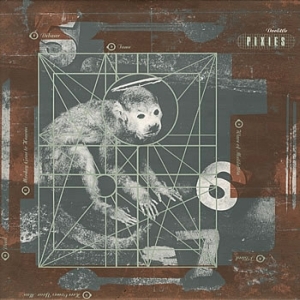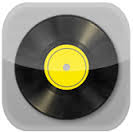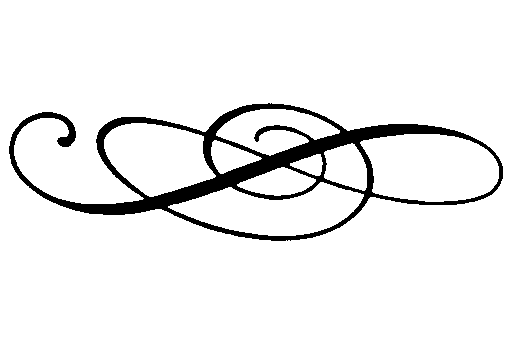

 Pixies
Pixies
| Release date | Label | Producer | Genre | Length | More info |
| 1989.04.18 | 4AD | Gil Norton | Modern Art Rock | 38:38 |  
 |
A Beach Boy's brain on Salvador Dali... or should that be the other way around?
Background
It warms my conservative heart to learn that Charles Thompson IV, in his own words, did not discover "contemporary" punk music until he was 16, happily living in the Sixties and early Seventies while the punk and New Wave revolution were taking place - I'm pretty sure that the Pixies wouldn't manage to achieve such levels of greatness, had the musical progression of Black Francis happened in reverse chronological direction. By 1986, when the Pixies had coalesced into a proper working unit, the American underground scene had already splintered into at least a dozen different directions, with most bands choosing themselves a nice, cozy, narrow niche and scrubbing clean each of its nooks - you had your pissed-off hardcore, your guilt-ridden folk pop, your young and innocent twee, your Sonic Youth and their clones, but you didn't have nearly enough of that "anything goes" magic touch, where you might start off in one direction and then just fling yourself to the wind of imagination, regardless of whether it might take you.
I am certainly not implying that Black Francis and Co. were completely alone in their free ride, and yet it is really tough, when you think about the late Eighties, to come up with the name of another band that could so elegantly combine so much. In comparison to the typical pop bands of that decade, Pixies "re-embraced their roots", re-activating the old tried and true chord sequences and song structures that went all the way back to the early British Invasion, surf rock, and Buddy Holly - without, however, sacrificing the advances and achievements of punk and New Wave bands in rock music's "Silver Age". By doing so, they pretty much laid the healing groundwork that allowed the temporary flourishing of pop music in the Nineties; but the most fascinating thing is not how many people they influenced, but how they emerged more or less out of nowhere - was there even a single record in the Eighties that sounded like Surfer Rosa? If there was, I have yet to hear it. Not surprisingly, the music has always been and remains timeless: it is so free of contemporary conventions that even now, in 2016, it sounds like it could have been recorded yesterday. Only it couldn't have been recorded yesterday, because the Pixies have an aura of artistic innocence to them that is nowhere to be found in the 21st century.
The major difference between Doolittle, the band's second and (according to general critical consensus) most perfectly realised album, and its predecessor Surfer Rosa, is that it was recorded on a bigger budget, distributed by a bigger label (Elektra), and recorded and produced after the Pixies got their first round of warm critical (if not commercial) reception. This is important, because the scope and general aim of the songs here is clearly more ambitious, and even if we won't go as far as to say that it represented Black Francis' plan of world conquest, we still must admit that it goes beyond merely "having fun": for Surfer Rosa, it is not clear that Francis had any plan at all, but for Doolittle, he most certainly had one. Very roughly speaking, we have a lo-fi to hi-fi transition here, so if you're a lo-fi adept, you'll probably want to brand this one a "sellout", which is okay by me; if only everybody were capable of "selling out" this-a-way!..
Some basic factsWith serious press coverage, MTV videos, decent airplay, and general word getting out, Doolittle literally put the band on the charts - although it is instructive to know that they would always be more popular in Europe than in their native country, with Doolittle stalling at #98 on the US charts while rocketing all the way to #8 on the UK ones (and all of the band's subsequent releases, including the 2014 reunion record, would follow the same pattern): apparently, their brand of intellectual pop was a bit too much for mass American audiences to take in (stupid Yanks and all that). As of now, it remains their best-selling record, and the most common answer to the question "where should I start with the Pixies?", not to mention the one LP to feature the most memorable sleeve - it's not that often that you get to see a monkey with a halo trapped inside an octagram.
Only very recently did the album finally see an expanded edition: Doolittle 25 came out in 2015 (should really be Doolittle 26, but round numbers win over production delays) with two additional CDs worth of material - one with a bunch of B-sides and live radio sessions, and one with a whole set of raw demos. Since I have not yet laid my hands on that one, I am not sure if it is going to be of much interest to anybody except collectors, but in any case, it's nice to know that the album's classic status has finally been confirmed with a proper deluxe edition.
For the defense
So, where should we start? Okay, first and simplest, Doolittle is a classy little pop album. It's got enough detours from the generic pop formula to be eligible for "important artistic statement" status, yet at the heart of almost each of these songs you will find ear-worms - modestly repetitive, well-constructed, emotionally resonant instrumental and vocal hooks that clearly show how "music therapy" was priority number one for the band, well before any intellectual appraisal of the album's lyrical or symbolic content. You don't need to go further than the beginning of ʻDebaserʼ: many bands would not bother to push beyond the opening bars of Deal's bass and Francis' droning rhythm guitar, but what really matters here is the uplifting-romantic pop riff that Santiago throws in at 0:08 into the song, clearly setting the stage for something brash and heroic. And I don't even need to mention ʻHere Comes Your Manʼ, with its guitar riff that should proudly carry the Buddy Holly Seal of Appreciation on it (in fact, it's hard for me to believe that Francis and Santiago did not steal that chord sequence from some Buddy Holly song, but fortunately for them, I can never think of an actual source).
For a small bunch of guitar-wielding indie kids with no Mellotrons or even Jew harps, it's quite pleasantly diverse, too: fast, mid- and slow tempos, melodies ranging from punk to pop to surf-rock to dark folk (ʻSilverʼ), with enough variety spread across those 15 tracks to prevent easy pigeonholing. Yet behind all this variety also lies a certain unifying concept, which is hard to formulate in words, but if roughly approximated, it would sound something like "Incidental Music For A Culture Overdose". Black Francis' songs are like tiny capsules in which he concentrates and diffuses gazillions of mini-impressions - musical, literary, cinematic, highbrow and trashy alike - and which he passes off as the average reactions of a culture-crazed, or simply an information-crazed Joe driven to inadequate, and sometimes downright crazy, behaviour by the world pressing down and around on him. It's very much the same principle that is essential to grasp in order to understand Talking Heads, but there's also a big difference: Doolittle does not have that much reflection and introspection, it is not about the protagonist wallowing in his own paranoia... it simply is.
The anthemic ʻDebaserʼ lays it on the line fairly quickly - with not-too-obscure references to Un Chien Andalou, it's like a layman's gut reaction to being exposed to the world of artistic strangeness and unpredictability, something a slightly offset teen could experience and pronounce upon a fortuitous visit to an arthouse. Like most Pixies song, it's very tongue-in-cheek, too - you never truly know if the band is celebrating this attitude or mocking it, and you'll never truly know it even when you reach the end of the album. One thing is for certain: Doolittle is all about growing up to be a debaser, and most of the time it's on, we're busy debasing everyone and everything in sight. Second song, case in point: don't you think that the correct words for the scream-your-heart-out overloud chorus section of the song is not "Cookie, I think you're TAME! TAME! TAAAAAAME!", but rather "Cookie, I think you're wild?" A very simple, direct, and unforgettable inversion of values.
But as far as I'm concerned, the real highlights of Doolittle are the anthemic songs rather than the cooky-gimmicky interludes. ʻWave Of Mutilationʼ opens with arguably the album's greatest guitar melody, a wobbly wave-like trill that resolves into an arena-rock set of power chords, and this is followed by Francis' most inspired bit of vocal arrangement - he's not a great singer at all, but he's a genius artist, and there's nothing quite like that contrast between the enigmatic breathy whisper of the first two lines ("cease to resist, giving my goodbye / drive my car into the ocean") and the loud, distant, echoey third line ("you think I'm dead, but I sail away"). It's like during the first two lines they're brushing in a speedboat across the water's surface, and then the third line shifts their trajectory 60-70 degrees and propulses them to high heavens, before making the backwards plunge for the chorus ("on a wave of mutilation"). Let alone the fact that the second verse unquestionably features the most seductive manner of pronouncing the noun "crustaceans", the song is like the perfect ode to narcissism and masochism rolled in one - I only hope that nobody gave in to its lyrics and atmosphere too easily, because it really taunts you to hop in your car and drive it off the highest cliff to make the grandest exit known to mankind. At least it's a good thing there ain't no cliff overlooking Mariana.
ʻMonkey Gone To Heavenʼ is often mentioned as an "environmental" song, due to its mention of the "ten million pounds of sludge" and "hole in the sky", but it would be too boring for the Pixies to simply write an ecological lament - it's really more than that, sort of an apocalyptic prediction where "this monkey" refers to all of us, and the two violins and two cellos are added to the mix to help complete the aura of quiet, but slightly amused sadness already generated by the repetitive chorus (almost makes it sound like the Electric Light Orchestra, in a way). Again, it's a pretty unique lyrical and musical take on the end of the world, neither too angry nor too morbid - although most people will probably remember it for the silly numerological bit in the middle, which Francis just threw in for some extra kicks but which does not really mean much of anything on its own (why does he have to scream "GOD IS SEVEN! GOD IS SEVEN!" at the top of his lungs as if he's having a sudden epiphany, or getting exorcised? No idea, but I guess we all love it anyway).
There's also "light anthemic", in the form of ʻHere Comes Your Manʼ, which was among the first songs Francis ever wrote - this explains the Buddy Holly-esque hook and the relative "fluffiness" of the tune (which was still released as a single, but apparently the band never liked playing it live in the good old days), yet it fits in very well with all the rest, even despite its innate optimism. Fact is, you don't really know what you're waiting for, you have no idea of who is your man and where he is supposed to take you to; you might just as well be a monkey waiting for him to take you to heaven. And a bigger fact is, there's no "optimism" or "pessimism" on this record - it's morally ambiguous as heck. It lives in two basic states: "overdrive" and "preparing for overdrive", but you got to be prepared to accept that the Doolittle universe knows not the simple contrast between "happy" and "sad". It does know the contrast between "loud" and "quiet", and the louder it is, the more chances you get at getting a great riff, and so ʻHere Comes Your Manʼ belongs in the same category as ʻDebaserʼ, despite being superficially more "accessible" to the general population.
And where is this overdrive stemming from? Like I said - culture overdose. Hyperbolic reaction to Bunuel on ʻDebaserʼ. Vampiric fantasies on ʻI Bleedʼ. Excitable young man reading the story of Bathsheba and Uriah on ʻDeadʼ, and then the story of Samson and Delilah on ʻGouge Awayʼ. Throw in some memories of a crazy Puerto Rican roommate (ʻCrackity Jonesʼ) and of various types of easy women (ʻTameʼ, ʻNo. 13 Babyʼ), some numerology, some Greek mythology (at least there are no songs about superheroes named Tony on this record), and what you have here is a slightly less educated, but much more easily excitable version of Stephen Dedalus swimming in a chaotic soup of his charged-up memories and encyclopaedic knowledge. Doolittle makes no major statements, issues no accusations, and would commit seppuku if it ever found itself overwhelming us with a much-too-serious attitude - but somehow its twisted, catchy, humorous, surrealist regurgitations of human experience are capable of producing a much stronger effect than oh so many Serious Works of Art.
For the prosecution
I do have to say that I've always found the track sequencing a little uneven: most of the big anthems and strongest hooks are lodged on its first side, with the first stretch of seven songs pretty much unbeatable in its onslaught. However, starting with ʻMr. Grievesʼ, whose mock-reggae verses sound like the record's first serious slip-up to me, the record becomes shakier: stuff like ʻNo. 13 Babyʼ, while not bad at all on its own, shares the same tempo and stylistics with ʻMonkeyʼ without being in possession of a comparably strong hook, and I can never remember much of interest about ʻThere Goes My Gunʼ or ʻHeyʼ, either. As sacrilegious as it sounds, I sometimes think they could have taken Gil Norton's advice and make some of the good songs a tad longer, sacrificing some of the weaker ones at their expense - for instance, you can say what you want, but two minutes is way too little for ʻWave Of Mutilationʼ. In other words, Doolittle is not all perfection, although I reiterate that even the weakest songs here still have a sense of purpose - it's just that most of the highlights are concentrated in the first half.
You could also say, I guess, that the twin guitar-bass-drums setup for this music does not fully justify its ambitions; and considering how well the strings work on ʻMonkey Gone To Heavenʼ, it is lamentable that more instruments, or at least a larger amount of guitar tones have not been used on the album (being well aware all the time that its budget, though significantly larger than for Surfer Rosa, still wouldn't allow for too much whipped cream). Normally, it works, and they are capable of tapping the instruments' potential (ʻWave Of Mutilationʼ is a prime example of how one guitar part fully compensates for the lack of a symphonic arrangement); but every once in a while, the guitars are just playing "standard" "alternative rock" parts (ʻGouge Awayʼ), and that's not ideal if you want to leave behind a proper masterpiece. That, too, is a little responsible for the excitement occasionally (very occasionally) dying down. I mean, would it have hurt them too much to at least drag a piano in the studio? Oh well, forget it. It's not like the prosecution has much of a case here anyway.
Conclusion
| Melody | Voice | Mood | Production | Innovation/Influence | Where it belongs | RYM preference | |
 |
 |
 |
 |
 |
 |
#16 (Apr 17, 2016) |

| Previous entry | Main page | Next entry |